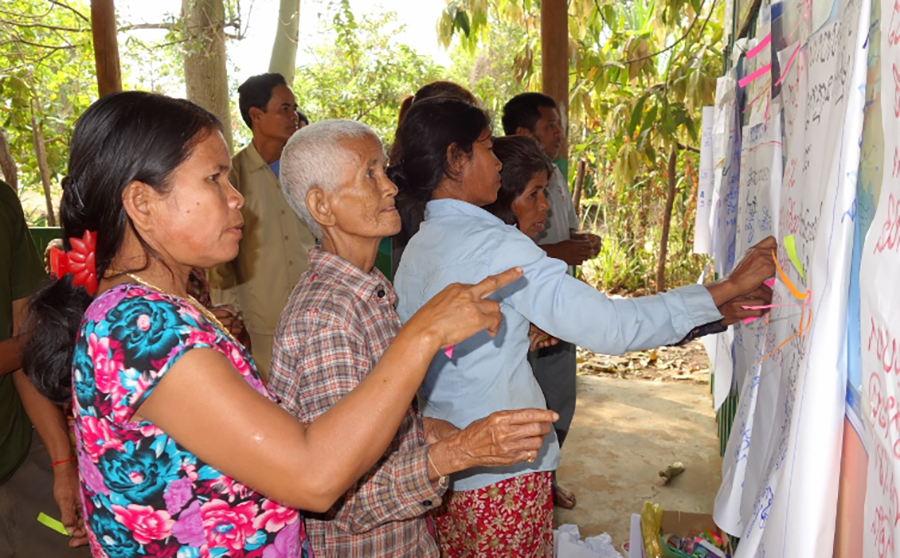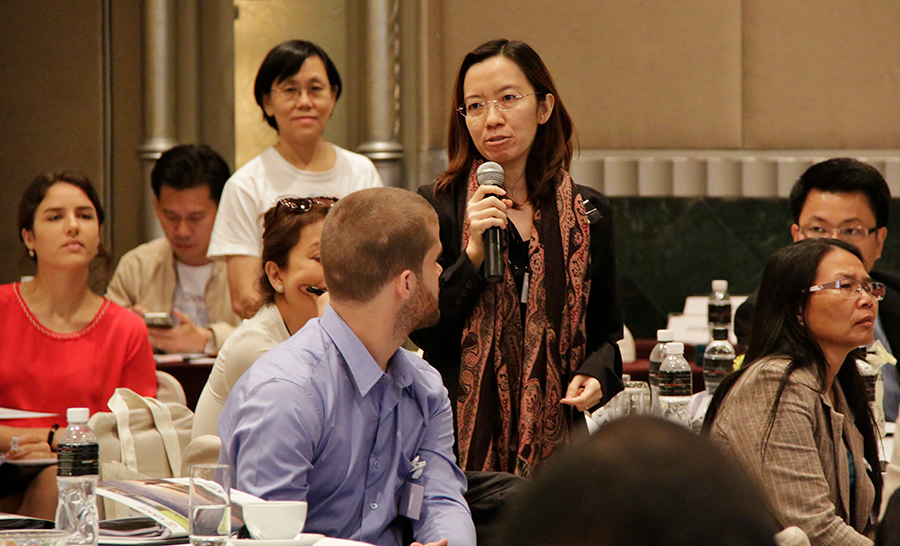Southeast Asia Ministers Adopt DAI-Assisted Regional Guidelines for Promoting Climate-Smart Agriculture
September 27, 2017
DAI’s environment team produced two technical chapters on agricultural resilience for guidelines recently adopted by the Association of Southeast Asian Nations (ASEAN). The chapters—on integrated farming systems and rice-shrimp rotational farming—address factors critical to the livelihoods of millions of rural people across the ASEAN nations of Brunei, Cambodia, Indonesia, Laos, Malaysia, Myanmar, the Philippines, Singapore, Thailand, and Vietnam.

Women in Koun Tnaot village, Cambodia, examine the vulnerability rankings for local agriculture developed by the Mekong Adaptation and Resilience to Climate Change project.
In contributing to the Regional Guidelines for Promoting Climate-Smart Agriculture approved by the ASEAN Ministers of Environment, DAI drew on its implementation of the five-year Mekong Adaptation and Resilience to Climate Change (Mekong ARCC) project, funded by the U.S. Agency for International Development. Though Mekong ARCC ended in late 2016, results from on-the-ground testing of the project’s adaptation strategies were captured in a evidence base and can be applied to agriculture practices across Southeast Asia. This evidence base addresses variables that promote farming success over the long term—including which crops to plant where, when, and in what variety—as well as techniques for raising livestock more safely and productively.

Participants discuss ways to finance climate adaptation programs during a workshop organized by the Mekong Adaptation and Resilience to Climate Change project.
In Vietnam, DAI supported the Ministry of Agriculture and Rural Development to test climate-smart rice-shrimp rotational farming—a common livelihood in the Mekong Delta that is increasingly threatened by harmful human practices and long-term changes in temperature and rainfall. The techniques applied and lessons learned under Mekong ARCC at a 54-hectare rice-shrimp pilot site were scaled up by the Vietnam government into national policy and programs that will potentially benefit more than 250,000 hectares for rice-shrimp farming across the Mekong Delta.
DAI’s contribution to the ASEAN’s regional guidelines was led by environmental specialist Kevin Carlucci and Mekong ARCC Deputy Chief of Party Shannon Dugan in cooperation with the German Office for International Cooperation (Deutsche Gesellschaft für Internationale Zusammenarbeit, or GIZ). GIZ leads the ASEAN Climate Resilience Network, which convened the ASEAN minsters and organized the new climate resilience guidelines. The regional guidelines are being showcased this week at the annual ASEAN Ministerial Meeting on Agriculture and Forestry in Bangkok.
RELATED CONTENT:
Documentary Describes How Project Delivers Clean Water for 1.8 Million Filipinos
A recently released 15-minute documentary describes how a DAI-led project in the Philippines made it possible for water providers to expand and upgrade their systems, and deliver water services to another 1.8 million people.
Read More